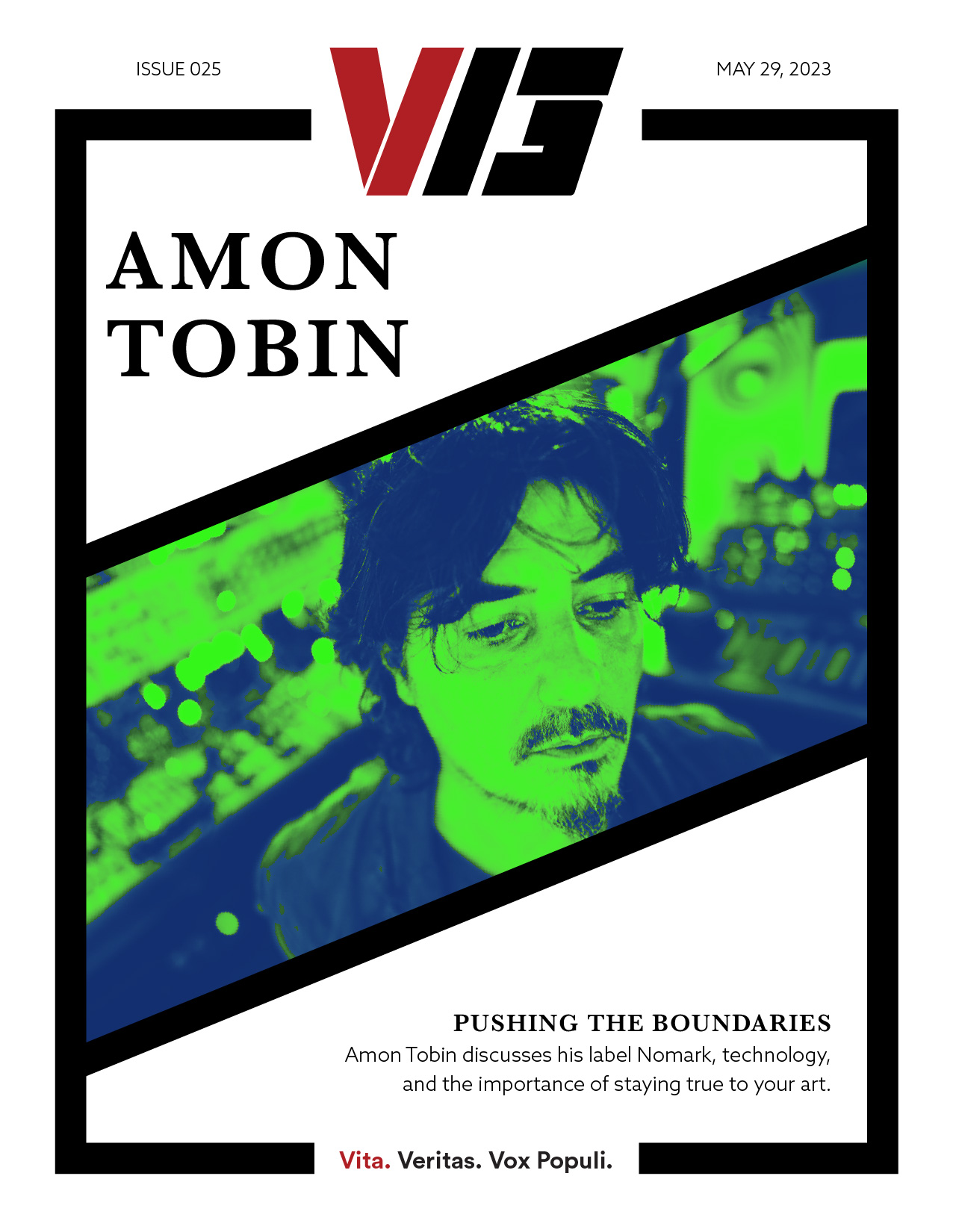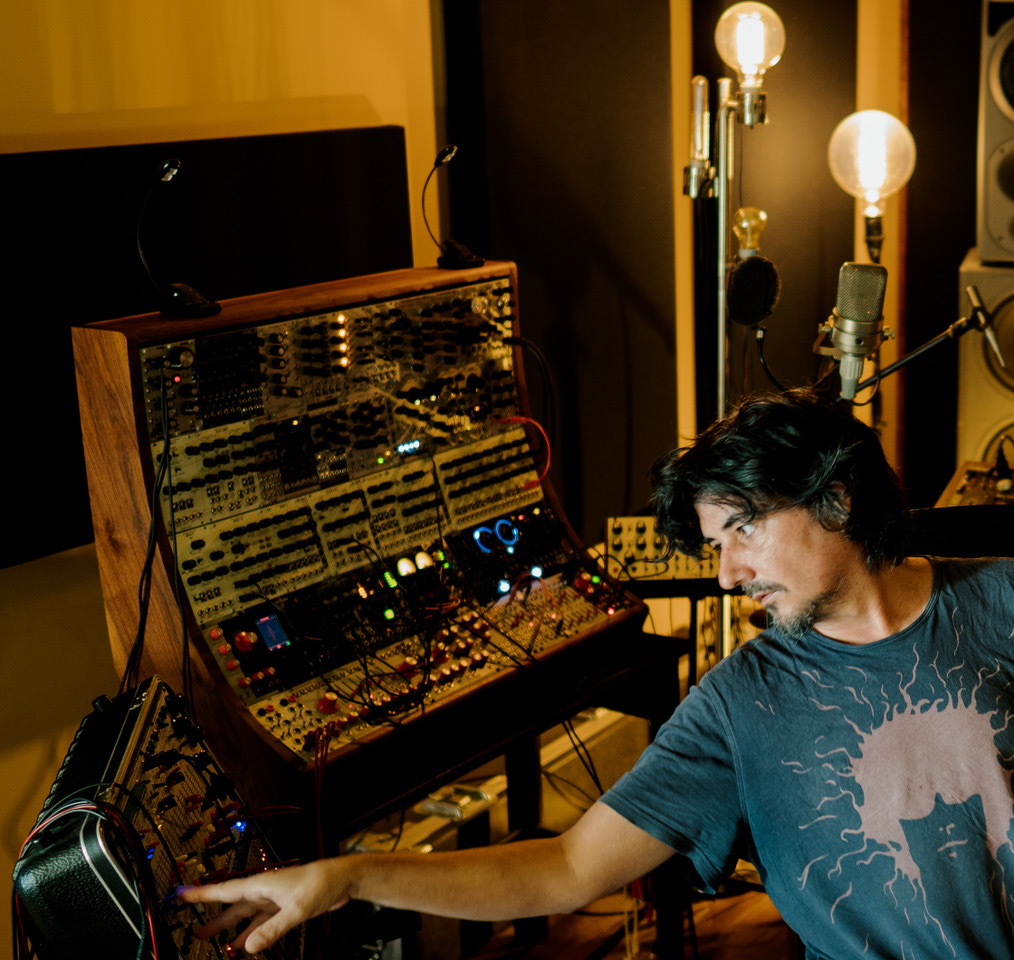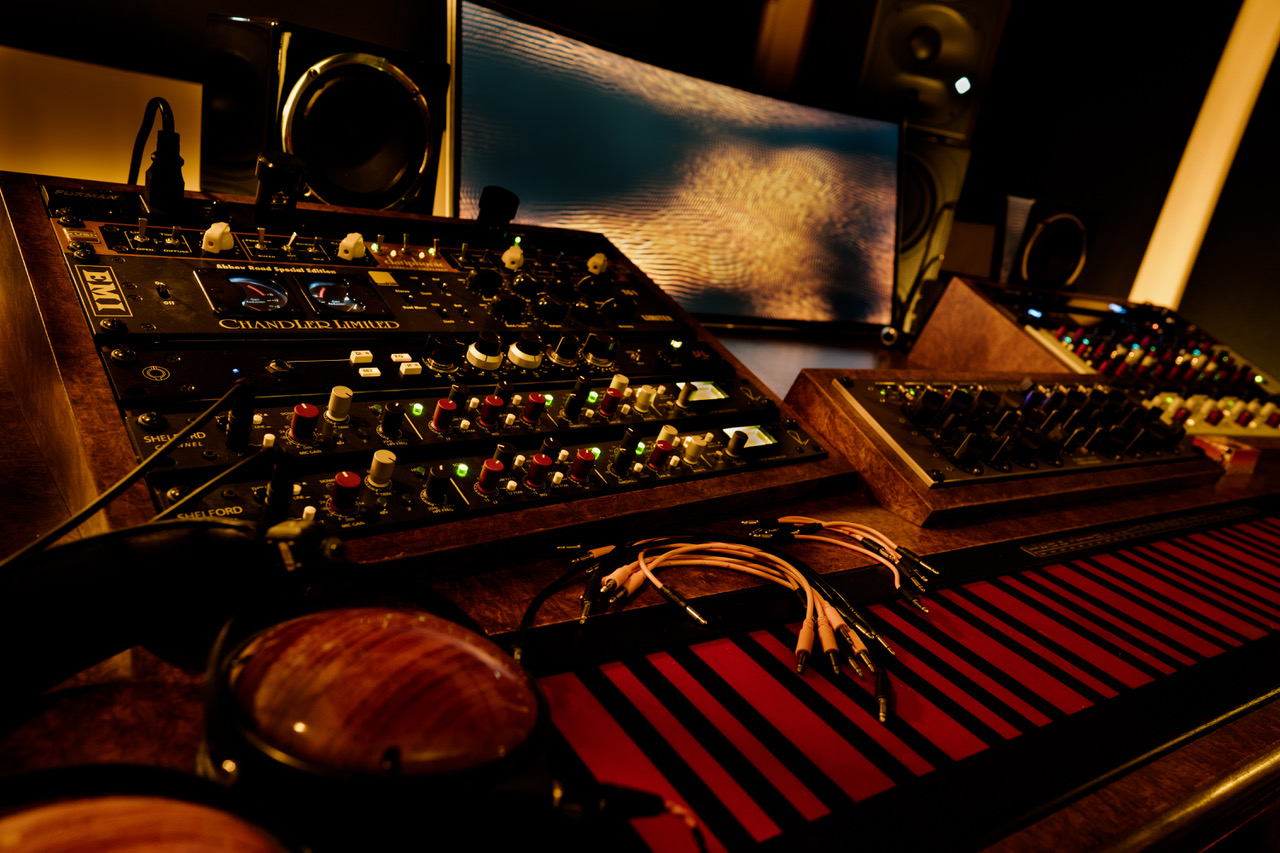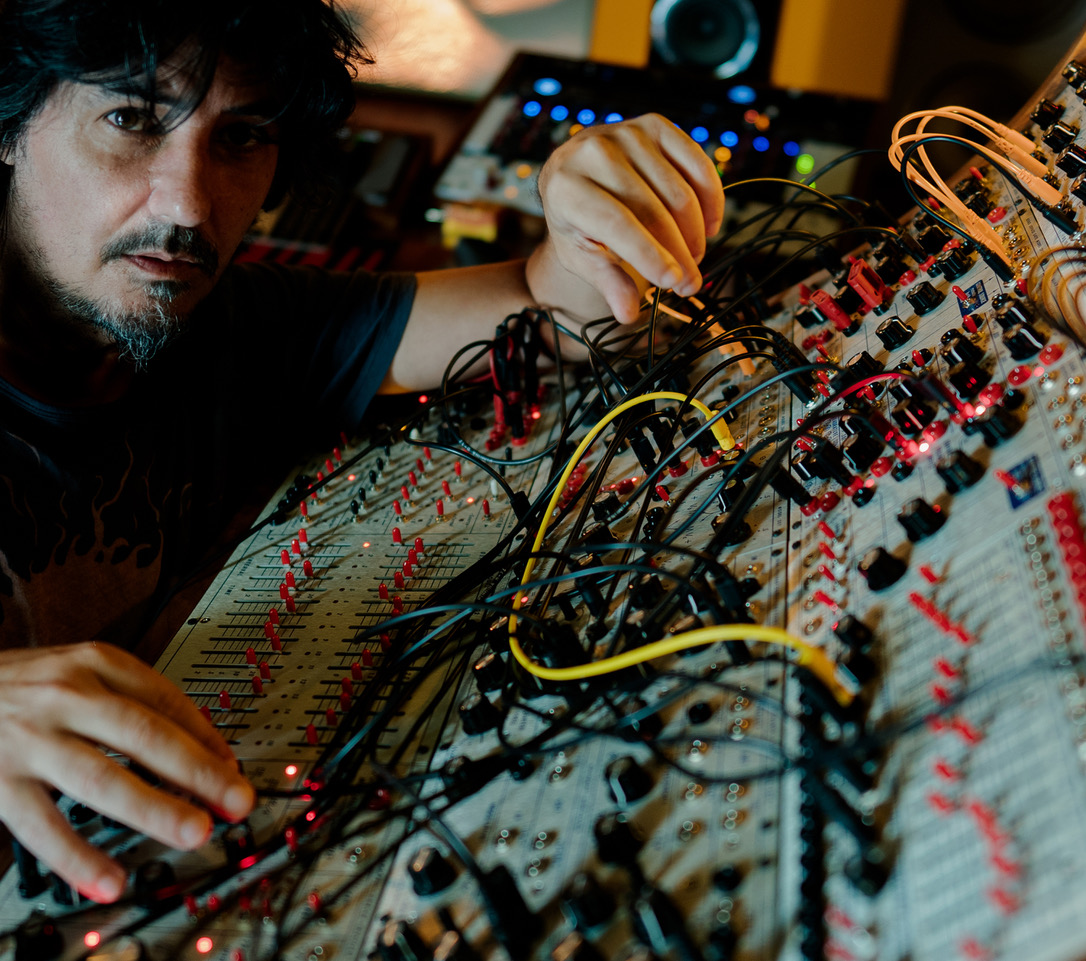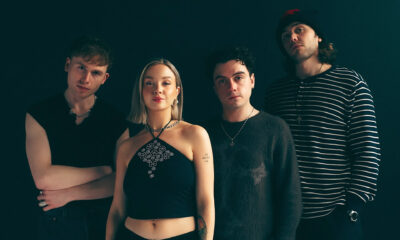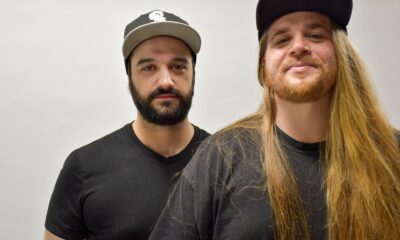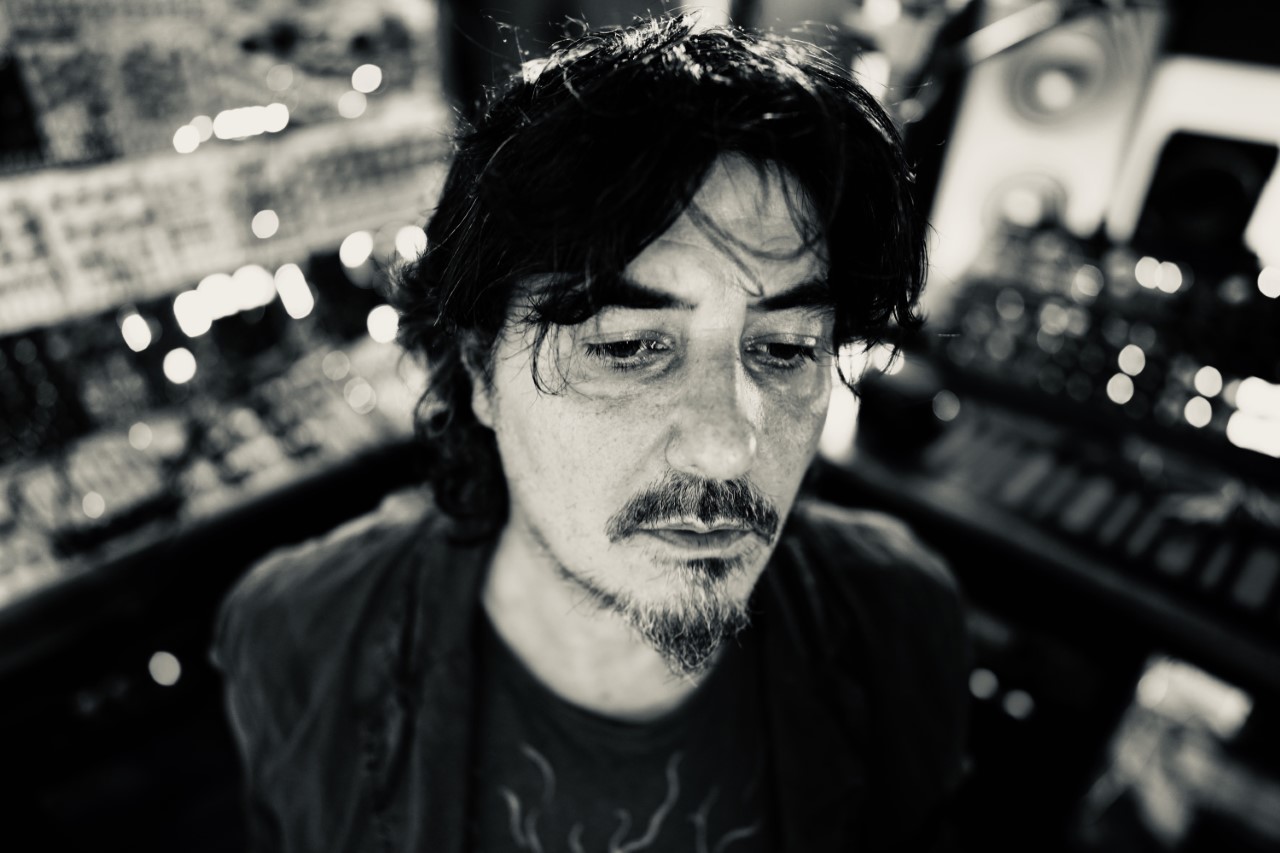

Dance/Electronic
Amon Tobin: “You’ve got to put some legwork in if you care about what you have in your life.”
In our latest Cover Story, electronic artist Amon Tobin talks about his label Nomark Records, how to stay true to your creative vision, and the shifting landscape in the creative world.
The creative industry is a world that moves so fast that you’re in danger of becoming lost. In the last five to ten years we’ve seen the explosion of everything from digital music to streaming platforms and social media to livestreaming gigs. In contrast to that, we’ve also seen the return of vinyl with year-on-year increases in sales of a format once thought banished to the history books.
So, how do you keep up with the trends? How do you reach your audience? How do you get the art you’ve created out to your audience? Well, one person who is trying to answer all those questions is electronic artist Amon Tobin. Having spent over two decades in the industry, Tobin launched his own label, Nomark Records in 2019 and, ever since, has been refining his business model.
This business model has included the launch of a subscription-based offering called The Nomark Club. In our latest Cover Story, we spoke to Amon about The Nomark Club, the fan-picked Nomark Selects V.1., his thoughts on technology in the creative industry, and much more…
Be sure to hit Amon Tobin’s official website here: www.amontobin.com.
Thanks for your time Amon. Let’s start off by discussing your reason on starting your own label?
Amon Tobin: “What I was really trying to do was get some autonomy around what I was doing. At that point, I had like five or six different aliases which I’d been developing over a long time. It’s a lot to really put on a label that has a schedule with, a lot of different artists. Just trying to get your own albums out in the space of a year or two, in some kind of release cycle, it’s really quite challenging. So, for me to realistically be able to release that stuff, I needed to do it in my own structure.
“Even now, it’s really hard to think the first year I put out something like six albums, it was ridiculous. Even now I have stuff that I can’t release for another year or so and it was unfair on Ninja to have that. Not just that, it was more also a practical consideration. I wanted to keep holding my publishing as the whole landscape of music changed so radically over these last 25 years. And, I mean, Ninja Tune are a business like any label, and they need to make their money off publishing, but I wanted to keep hold of it.”
“I think what you realise putting out music independently, is you need to always look at things as much of an opportunity or find the opportunities that come out of any situation.”
From dealing with labels over the last 25 years, what the most important lesson you’ve learned?
“It’s hard to say that because everything’s changed so much since I started so the things that I might have done 20 years ago, or even 10 years ago, even five years ago aren’t necessarily what I do now. out, because the landscape is completely different. So, I’m not sure it’s really applicable now. It was a good thing for me at the time to be on a label, with an infrastructure and a reputation and all these things that give credibility to what you do.
“Now, I think the role of a traditional label has shifted a lot. Obviously, the distribution model has changed so radically, at this point, you have to think, what is the label able to offer you because it’s not so much to do with getting your records in shops, because that’s a moot point. Even things like press are a bit of a moot point, since everything’s been dominated by social media, which tends to run in an independent shape. Having your label shout about what you’re doing is going to get very little reaction compared to the artists themselves saying, what they’re doing.
“Now, if that’s the case, then why do you need the label? The question of why do you need the label rears its head even more? Now, I’m not I’m not saying there’s no reason to have a label, I think it lends credibility to what you do, you have a sense of validation, being part of an organised and accepted entity.”
I suppose, on the flip side of that, like you said, with social media, if you’re an artist, say your album or your song goes viral, you’ve almost done that yourself?
“Well, that’s how it’s tends to work. And that comes with its own set of problems too. I mean everyone hates social media for that exact reason. It’s such an awful way to promote anything, there’s so much wrong with it. Then the idea of a democratised landscape is such a false narrative as well when you consider the algorithms are subsidised. These things are bought and paid for in a pay for play type thing, that is very much alive but it’s in a different form.
“So, in the end, I mean, it’s… I don’t know, what a new artist can do at this point. Over the amount of time that I took to establish myself, I was able to build a base for what I’m doing, an interest in what I’m doing, just at the edge of the big shift in everything going to social media and all of that. At this point, for new artists trying to break, I’ve no idea how they do that, beyond dancing around to a TikTok video, I don’t know what the right thing to do is.”
Just going back to something you said. You’ve got six albums in the pipeline that you can’t put out at the moment but, from your point, that must be a great position to be in terms of having work ready to come out. You started the label in 2019 then COVID hit. Did that affect any of your plans? Did you have to adapt much?
“I’ve been in the same boat as everyone. It affected touring, and blah, blah, blah but, I think what you realise putting out music independently, is you need to always look at things as much of an opportunity or find the opportunities that come out of any situation. COVID gave everybody an opportunity to dig down and think about how everyone is at home so what can we do to connect? Let’s start building communities. Let’s start putting our efforts into making connections with people through things like Discord, for example.
“My Discord came up at that point and my own subscription model for my label with Nomark club was something that we put our energies into. Let’s scale down the reach from playing to 1000s of people at a festival to looking at maybe just handfuls of people that are really engaged but in a very small curated way. I think it’s funny because, even now that people are out and about more, and going to shows, I think there’s a lot left over from that. Those things still matter now. The foundations have been built now for that stuff to grow.”
Do you think that shifted the way the industry thought about itself? I’ve spoken to a lot of artists over the last two years who said that they used the time to relook at the way the way they worked? Was that the same for labels? Was that the same for you as a new label manager?
“Promoting a label is always going to be a difficult thing. I think that really, for me, it’s so different from artists to artists and labels to label. It’s really hard to say something that would be relevant to anybody else especially because my label is really just a vehicle for my own music. I don’t have other people on my label. I’ve got five different aliases concurrently. That’s what I do. It’s not a model that I think is necessarily transferable. We did what everybody tried to do, which is just make what you’re making special enough that people give a shit about it. That just means it all just comes down to trying to make cool stuff, trying to make things that are really good, that you think are really good and then just hoping that other people think it’s good, too.
“The barrier, of course, is that the noise, the level of noise, makes it’s very difficult to reach the people that might even like what you do. That’s the toughest nut to crack. I think everybody feels that, it doesn’t matter how much love you put into your thing, or how, how great it is, or how relevant it is, or any of that. What matters is, can anybody who might like it even get to it, or ever even hear it? That’s part of a wider conversation. How these algorithms work.
“That’s really something I recently got into a little bit of a Twitter rant about that. I was trying to rally the point of view that we really need to look ourselves as individuals. I’m not talking about artists now. I just mean as listeners and music lovers as people who don’t need to basically put a bit more legwork in if we want things to be real. If we want things, if we want real experiences, we can’t just sit back and let these these streaming services and these these social media platforms suggest what we might like based on whatever calculation some fucking algorithms made.
“Actually join people’s Discord. Join people’s communities. See what human beings on the other side of those things are recommending to us. What are they saying? It’s an old man perspective but it has some credence right? That’s how we did it for however many years right? Just word of mouth. What are the people you like, liking, and why did they make it? What did they not like? That’s a conversation you need to have with people and where do you meet people? Well, I guess you meet them online in these communities so you have to join them and actually be participating in that stuff to have access to that. Otherwise you just sitting there being fed whatever bullshit someone’s paying for the most.”
Is that where the idea for the Nomark club came from?
“Yeah, it was really about starting really small with something that people who really cared about it could get access to. I found out that there’s some merit in elitism instead of this whole make fucking fluffy like everything for everyone is often a bit of a euphemism for just laziness. I look back on things like looking for records, like when you looked for a special piece of vinyl, you had to go and find it. It wasn’t everywhere. It was there because you found it. You put the legwork in so what you got back in return had some value. This is the same thing. You’ve got to put some legwork in if you care about what you have in your life and there’s plenty of people who are willing to do that.
“That’s fine, but that’s it. There are those people who don’t necessarily have the same passions that you might share and that’s alright but the people who do I think they need to realise that it is a participation thing at this point. The choice is really in everyone’s hands. They can either sit back and be fed through a straw like those people on Wall-E that sit in that space cruiser, or they can try and move and make their own thing happen. I don’t know. It all sounds a little bit rah, rah, but I do think that you fucking need to need to step up. I have this same perspective with technology. AI, all the buzz shit that’s going on? I don’t know. It’s so much to do with personal choice.”
Now, AI is something I’m going to discuss later because I think we’re gonna go down a whole rabbit hole with that. Sure. Something you said about people making choices. Now you’ve got the Nomark Club and you have the compilation out. Did the subscribers select the tracks? Were you happy or surprised with the choices?
“What we did, because I’ve got a bunch of material. What I did was I made pretty much every month since we started this thing put new music up that was just for the subscribers. Now, it’s not cheap to subscribe. It’s like 60 bucks a year. I mean, it’s like five bucks a month, which isn’t out of line with what people normally do, but it’s a lot. I really wanted to keep it in house and just for the people that subscribed. What’s happened is that we can’t do vinyl, and things like that but a lot of the subscribers wanted vinyl. What we did was we said, you decide on the tracks you might want on vinyl, and we’ll release a selection of say 10 tracks.
“We’re up to it must be over 30 maybe more tracks on Nomark, just exclusive. Plus, the people who sign up, they get all the digital releases of everything else. So, those six albums I talked about, they get all that as well, right? The idea is that you get everything I put out, plus you get this corner of stuff that I made just for you. Out of that, they voted on 10 tracks that they wanted to maybe put on vinyl. So that’s what we did. We did a compilation. We haven’t quite announced the vinyl yet. We hinted at it but that’ll be really soon.”
With all those tracks in the vaults, will there be more than just one compilation?
“Well, we did the subscriptions in these volumes. So, you subscribe for a year and you get volume one. Actually, if you subscribe, you get all the volumes and I think we’re up to three or four. Each year your subscription relates to a volume. We only made a selection for this compilation available from the first two volumes because we wanted to make sure that people still had things that nobody else could have. The stuff that’s maybe two, three years old now, the stuff that we can put on this compilation, but it’s new to anybody who isn’t in the club. People who are in the club, get it on vinyl.”
As a business model that sounds great for somebody that is really into the music. Do you see it being a path that other labels go down? Or have you seen other labels do anything similar?
“I think the subscription thing is pretty much the way everything has to be at this point and not just for labels, look at Netflix and HBO. There’s a reason that why that’s happening and it’s because of the way the market is that we’re in and just the way the internet is. I think the majority of people went down the Patreon route as far as individual artists. I don’t know about labels, but artists individually went down the Patreon route. I’ve always had a bit of a barrier with Patreon just because it’s something I felt I always felt uncomfortable with the idea of. I don’t know, it’s almost like, I hate this narrative of ‘hey, support me, I’ve got my hat in my hand, can you support me please?’
“I haven’t got cancer, I don’t need support, what I need is an exchange which is what you pay for with this subscription. Let me make the music that you then hopefully want so it’s an exchange. I’m not on a drip here, begging for change. I don’t buy into any of that. It’s too much as well. There’s the general sense of disingenuous gratitude.
“I don’t think it’s even fair to the people who do subscribe because they’re then put in a weird guilt trip about doing this to support. If you really break it down. What do you love? Do you want more of what you love? Then fucking support it.”
“That whole thing was so ugly for a while. All like give me some money and I’ll come fucking cook you an omelette? Or all like, I don’t know, man… I’ll give you a hand job behind a fucking shop or something. You know what I mean?”
“I’m trying to find the technology that will help me realise what I want to do. If it’s available, I’ll use it. If it’s not, if I need to make it.”
Yeah, it was like meet and greets. That one exploded out of nowhere. Before, we used to hang out at the back of venues and get autographs when the bands came out. Now it’s like, pay two hundred quid and you’ll get 30 seconds with me.
“It’s fucking crazy. First of all, I don’t think it’s worth that much to shake someone’s hand. Secondly, it just seems now it’s not just about the music. You want the music? Buy the music and I’ll make music. Also, you don’t have a say in the music I make. There’s this idea that if you invest in something, you have a say in its direction. No, you don’t. This isn’t a democracy. That’s not what people want, either. You know?
“Who wants to be spoon-fed what the artists thinks they want their audience to hear? An artist has a singular vision that they either like or don’t. I love this art because they do exactly what they want and I happen to like it. That’s genuine. I think this idea of a product that you’re making for a market is so gross. Are you an artist? Are you a brand? What the fuck. I hate all that shit. None of that works for me. I feel like this Nomark thing was difficult because it’s not an established platform like Patreon is so we had a lot less reach with all of that. It’s still tiny. It’s a tiny thing.”
That being said, the people that buy into it, the people that get the records and your music are the people that really love what you do. So they’re not just buying the product, they’re buying into what you do…
“Exactly. They also know that it’s sincere. It’s not a marketing tracking enterprise.”
In terms yourself as an artist, you’ve talked about the different personas. What does the future hold in store for you? Where do you see your career going?
“Well, at the moment, I’ve lost myself in making some short films and videos as well. We have this massive back catalogue. Now, Nomark, none of it really has any visual representation so I’m into the idea of releasing a series of visual accompaniments to some of the music that has come out and doing that for new stuff as well. So ‘Shy 1’, one of the aliases, has this visual which is just the word shy with the number one. Shy 1’s been making quietly making these little videos and shorts and it’s been really cool. There’s some of them up on my YouTube channel already. For each release, we will hopefully have something like that which I think can open a door to doing something narrative with music as well.
“I’m trying to get the skills of actually making something worth showing down before I get too carried away. Like everything though, all of this takes a long time. Each of these aliases took years and years and years to incubate and to develop before I put anything out. So it’s similar with Shy 1, except you can see the learning process in real time because little snippets of what’s being made is coming out.I feel like there’s some good things around the corner for that.
“The subscription thing hopefully will keep everything afloat. It’s like I say, it’s a cottage industry, it’s tiny but it’s growing and there’s a lot of passion for it. I really hope that we can reach more people with it, and it can grow and sustain itself. I’d love to see Nomark release other people’s music at some point and become more of a traditional label but, for that to happen, we really need to be able to offer what a label should offer. I don’t want to put artists in the position I’m in where I’m making no money from the music, and there’s no budget for promotion. If I sign someone, I want them to have that, and I just don’t have that. So, we’ll see where that goes and, if that happens, that’s great.”
Going back to the visual side and the amount of time and effort it takes. How challenging is it to keep up with technology, and what are your thoughts on AI and the creative industry?
“My approach to technology is a bit the other way round, where it’s more like, I’m not really trying to keep up with technology, I’m trying to find the technology that will help me realise what I want to do. If it’s available, I’ll use it. If it’s not, if I need to make it, then I’ll make it and I’ll adapt the technology that exists to work in a way that wasn’t necessarily built to do what I want to do.
“That tends to be the way you grow with technology, or at least for me. That’s the way it was back when I did those big shows. The technology wasn’t there, we had to build it to be able to do that. Now, I’m trying to use what I can find in terms of Unreal Engine, Cinema 4D to try and make what I want to make but there are limitations in what those things can do. So, then I have to try and adapt.
“It does feel like every new technology that we see shift into the public view, is generally greeted with suspicion and contempt because there’s always this thing saying that it is now the technology making the art. It’s not the artist anymore and it’s not helped by the fact that’s how the technology is sold. Technology tends to be sold as a convenience tool, like, do what you were doing before, but quicker and with less effort.
“That’s the market thing for technology and it appeals to the lazy fuckers who don’t really want to put any effort into doing they just want the results. The problem with that, of course, is that it’s a cycle. You can think of anything as a technology, electric guitar was a technology and it was snubbed by the acoustic guitar players, photography was a technology snubbed by the painters.
“What technology affords us is an opportunity to keep pushing beyond what the bounds of that new technology can really do. Our job as creative people is to look at what the limitations of a technology are and work hard to do more than what it offers.”
“In the end, what technology affords us is an opportunity to keep pushing beyond what the bounds of that new technology can really do. Our job as creative people is to look at what the limitations of a technology are and work hard to do more than what it offers. So, that will never change. I think AI is a little bit different. I think it is a bit of a paradigm shift and I don’t know if that sentiment is directly applicable to AI but I feel that, at least now, I don’t know, in a few years, it might be very different, at least now, I think it still comes down to how are you going to use it.
“The majority of stuff made with AI is garbage but that is because people make terrible creative decisions. There’s a few amazing things made with AI and that was no different to what was happening with whatever technology came before it. I have the point of view that actually, as creative people, the only thing we can really take credit for are decisions. We’re not actually creating things, we’re reorganising existing material. That’s what we do in music and art. We’re not discovering new colours, we’re not discovering new notes. We’re positioning these existing things in new ways, shapes and so on. So it’s almost like an editorial role that we have as creative people.
“I know I can be challenged on that and that’s fine, but that’s my view. That applies to any technology. You can take AI and you can make good decisions about how to use it, creatively interesting decisions or you can make boring decisions on how to use it. The decisions are yours to make, as always. I feel like that’s where we are now. If we lurch into general intelligence, then we’re in another world.”
That’s an entire conversation on its own, isn’t it?
“Yeah, then, inevitably, we’re into super intelligence and who even knows if we’ll be here to enjoy any of this stuff we’re talking about?”
Just to wrap up then. Looking back over your career, what are you most proud of and what what are your hopes for the future?
“I really think the thing I’m most proud of is, is really doing what I want. I feel like I was able to do that, in spite of a lot of pushback and I do feel pride in that. It might sound arrogant but I am. A lot of what I decided to do was a fucking disaster. A lot of the stubborn decisions didn’t work out in my favour so I’m proud that I’m able to still even make what I want to make and it really is what I want to make. I don’t think that’s necessarily an easy thing to do for that amount of time but I’ve done it but I do take some pride in that.”
For more information on The Nomark Club and how to subscribe, click here.
-

 Music5 days ago
Music5 days agoTake That (w/ Olly Murs) Kick Off Four-Night Leeds Stint with Hit-Laden Spectacular [Photos]
-

 Alternative/Rock7 days ago
Alternative/Rock7 days agoThe V13 Fix #010 w/ High on Fire, NOFX, My Dying Bride and more
-

 Alternative/Rock2 weeks ago
Alternative/Rock2 weeks agoA Rejuvenated Dream State are ‘Still Dreaming’ as They Bounce Into Manchester YES [Photos]
-

 Features5 days ago
Features5 days agoTour Diary: Gen & The Degenerates Party Their Way Across America
-

 Culture1 week ago
Culture1 week agoDan Carter & George Miller Chat Foodinati Live, Heavy Metal Charities and Pre-Gig Meals
-

 Music1 week ago
Music1 week agoReclusive Producer Stumbleine Premieres Beat-Driven New Single “Cinderhaze”
-

 Alternative/Rock1 week ago
Alternative/Rock1 week agoThree Lefts and a Right Premiere Their Guitar-Driven Single “Lovulator”
-
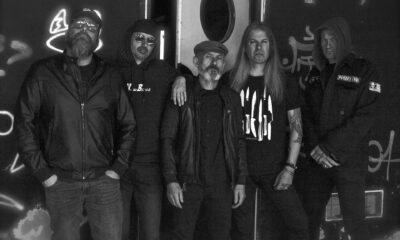
 Alternative/Rock1 week ago
Alternative/Rock1 week agoDeath Wishlist Are Fiery and Fierce with Their “I Get Bored” Video Premiere

